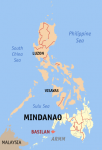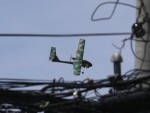One of the definitions of Crisis as an Ideogram is “Danger, mixed with Opportunity.”

Woe betide nation-states and actors unable to navigate this tricky path. For the government of the Philippines, China, and the Moro National Liberation Front (MNLF), recent events have been a poster child for this concept, as evidenced by the dual crises at Panatag (Scarborough) Shoal and ashore in Zamboanga City.
The Zamboanga Crisis shows how maritime power is very much an enabler for non-state actors (NSAs). The entire Sulu island chain is one very large ratline; porous and a challenging region to monitor. The Moro National Liberation Front, as do many other NSAs, takes good advantage of the geography and the lack of patrol enforcement and coordination between the Philippines and Malaysia – easily slipping across the borders uncontested. The absence of law and order, as well as numerous informal economies make it ubiquitous that inhabitants travel in large, and in most cases armed groups. As a result, Nur Misuari’s MNLF was not only able to thrive in Sulu following the 1996 peace talks, but he was also able to build a large, and by all reports, well-equipped following in Malaysia’s Sabah peninsula. Undoubtedly, the thin security situation on the water and coastlines helped facilitate unhampered movement of his personnel as well as transshipment of logistics and arms.
It’s been all opportunity and no danger for China. The PRC is using Panatag Shoals as an expansion of it’s Nine-Dash Line Plan to gain control over what is considered integral territory. Capitalizing upon ASEAN’s inability to reach consensus on security and cooperation over contested territory, China likely will remain in physical possession of the seized islands well inside the Philippine EEZ. Beijing also benefits through Manila’s struggles to build a Credible Defense in a time of economic challenges, and is counting upon the lack of clear focus on Pacific foreign policy by the Obama Administration. The mixed signals of the “Pivot to the Pacific” coupled with US Secretary of Defense Hagel’s reiteration about US neutrality on issues of sovereignty are all green lights as far as the Chinese are concerned.
For Nur Misuari and the MNLF, the Zamboanga City attack is a last gasp. A lot of peril, but with corresponding big stakes. Having been locked out of the ongoing OIC talks, the aging but defiant Islamist revolutionary has nothing to lose. The attack is an attempt to bring attention back to his organization’s unresolved demands and buy him a seat at the table. The attack would have been more successful had he not chosen to use the densely trafficked (and monitored) Basilan Strait to land part of his troops on mainland MIndanao.

Even with a dearth of assets, Philippine Navy and National Police elements could not help but note a company-size movement on boats speedier and more well-equipped than local fishing traffic. This miscalculation apparently threw the rebels’ timetable off as the insurgents already ashore were forced into a series of skirmishes in barangays (neighborhoods), short of their ultimate goal of taking the entire city. Misuari’s trump card may still be played; over 4,000 fighters encamped in Malaysia’s Sabah peninsula. If the MNLF chooses to restart fighting amongst the Palm Plantations, the resulting refugee crisis alone could overwhelm what little control both nations have over the area.
For the Armed Forces of the Philippines and in particular, the Navy, it’s been a mixed outcome. On the one hand, the fortuitous success of detecting MNLF movements spoiled what could have been a prominent rebel victory in government-held areas. On the other, PN Flag Officer-in-Command Jose Luis Alvano is tasked with an impossible mission – to remove over eleven tons of concrete from Panatag with no assets or funding, AND keep the Shoals in Philippine hands. It’s the peak of Monsoon Season, and one of his only two platforms with enough range, speed and on-station endurance is in drydock until October. Confronting China Marine Surveillance with Navy ships brings it’s own set of concerns, and Defense Minister Voltaire Gazmin publicly admitted there’s no way to keep possession of the Shoals without occupying them – an intention that current capabilities cannot support.
Finally, for the Aquino Administration, there’s nothing like a rebel uprising as teachable moments:
Lesson 1: Infowars matter – the lack of maturity around how to handle Social Media coverage of the event is painfully evident – from broken boots, troops short of rations, to operational security and hobby-shop drones

– the government is learning how to manage crisis communications effectively in a school of hard knocks. At least Zamboanga City’s Twitter account was warning residents to stand clear of impending air strikes.
Lesson 2: Your enemies could be next to you, not in front of you. Prior to the conflict, Representative Rudolfo Biazon, Chairman of the House Committee on Security and National Defense, had been questioning all the big-ticket Modernization items the Administration was obtaining. Biazon’s soapbox issue is ditching the conventional arms purchases and focus more on Counter-insurgency (COIN) assets that could double up in times of Humanitarian Assistance/Disaster Recovery (HADR). The crisis can only provide more fodder for his call. But that pales next to Vice-President Jejomar Binay’s trangression; unilaterally brokering a failed cease-fire with Misuari without Presidential authorization, all for the sake of grandstanding. Reputedly, Binay is seeking to distinguish himself from Aquino as part of a presidential election bid in 2016.
The bright light for the Administration is the quick and effective response to the MNLF attack – locking down a security cordon in Mindanao and preventing any escape, while balancing a difficult urban combat situation exacerbated by hostage-taking and literal town-burning.

But Panatag Shoals beckons like the hazard that it is, both from a navigational as well as foreign policy viewpoint. Aquino has shown willingness to confront the Chinese in the past, but without capabilities, all he can do is present an inconvenience to Beijing’s aspirations. His most powerful option is to compel international condemnation through the UNCLOS tribunal and hopefully bring China to the table over a real and substantive Code of Conduct.
Juramentado is the pseudonym for Armando J. Heredia, a civilian observer of naval affairs. He is an IT Risk and Information Security practitioner, with a background in the defense and financial services industries. The views and opinions expressed in this article are those of the author, and do not necessarily represent the views of, and should not be attributed to, any particular nation’s government or related agency.

One thought on “Crisis: Danger and Opportunity”